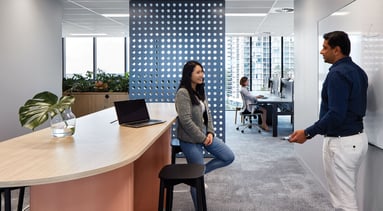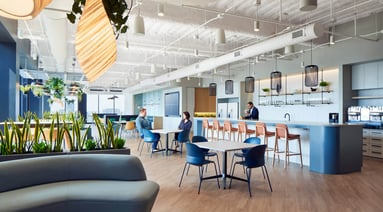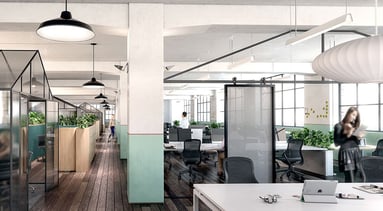India's future workplace: Embracing hybrid work

As India prepares to return to the office, Abi Roni Mattom, Country Director, India, shares how Indian businesses are taking a more strategic approach to expansion with the introduction of ‘hybrid’ work.
One of the biggest challenges solved by the introduction of remote and hybrid working is expansion.
India’s economy is currently on track to grow by over 10% in 2021.
It’s an astonishing growth rate that, on a micro-level, has historically forced many organizations to hastily snap up the first available office spaces to support their ever-expanding workforces.
However, with hybrid working, firms can often onboard new project teams remotely, without the necessity of providing a new desk per recruit.
“It’s clear that the function of the office is changing due to the introduction of hybrid working models, and thankfully this should mean the end of the cookie-cutter approach to office design in India,” says Abi Roni Mattom, Country Director for Unispace in India.
“We’re going to see hybrid workplaces that are much more closely geared towards the organization’s specific goals, such as upgraded facilities to support client hospitality, or better technology to keep workers connected when they’re not present in the office.”
Indian workers have embraced working from home
A recent study by PaperGiant, found that 66 per cent of Indian employees want to work completely from home and a further 70 per cent have reported an increase in job satisfaction since the pandemic.
“Before the pandemic, working from home was a privilege of the IT sector, with strict policies and guidelines, but the first wave of the pandemic forced all industries to create makeshift remote working provisions,” says Abi Roni.
“Now, the second wave of the pandemic has really driven home the realization that the way we work, and the role of the physical office has changed.”
Rebuilding around the employee experience
The upshot is that both Indian businesses and multinationals with a strong Indian presence are looking at how hybrid working models can be introduced into their organizations.
The premise is that going forward, employees will spend part of their time in the office for strategic and revenue-generating activities and the rest of their week working from home.
“There’s a growing understanding that the physical workplace isn’t somewhere employees need to turn up to every day,” notes Abi.
“This presents an amazing opportunity to reconfigure existing spaces away from the generic sea of desks to which we’ve become accustomed, and towards environments that empower employees to do their best collaborative and strategic work.”
A blueprint for the future
India’s battle is not yet over. However, the success of remote working and the resilience shown by the business community in India has created a unique opportunity to rethink conventions and embrace new ways of working.
Unispace has developed The Propeller Workplace, a new framework for post-covid office design. It combines the ease and familiarity of working from home and the collaborative nature of the physical office to create an environment for effective hybrid working.
Is your organization looking to redesign its office space for a post-COVID world? Download our Propeller Workplace Guide or get in touch.
About Abi

Abi Roni Mattom, Country Director, India - Connect on Linkedin
As a thought leader within the corporate real estate industry, Abi brings over 17 years of experience delivering exceptional workplace solutions for some of the worlds most innovative brands. Having shared the stage with fellow leaders at global industry forums such as CoreNet and DBIA, Abi has a passion for sharing his knowledge and insights to empower others.


